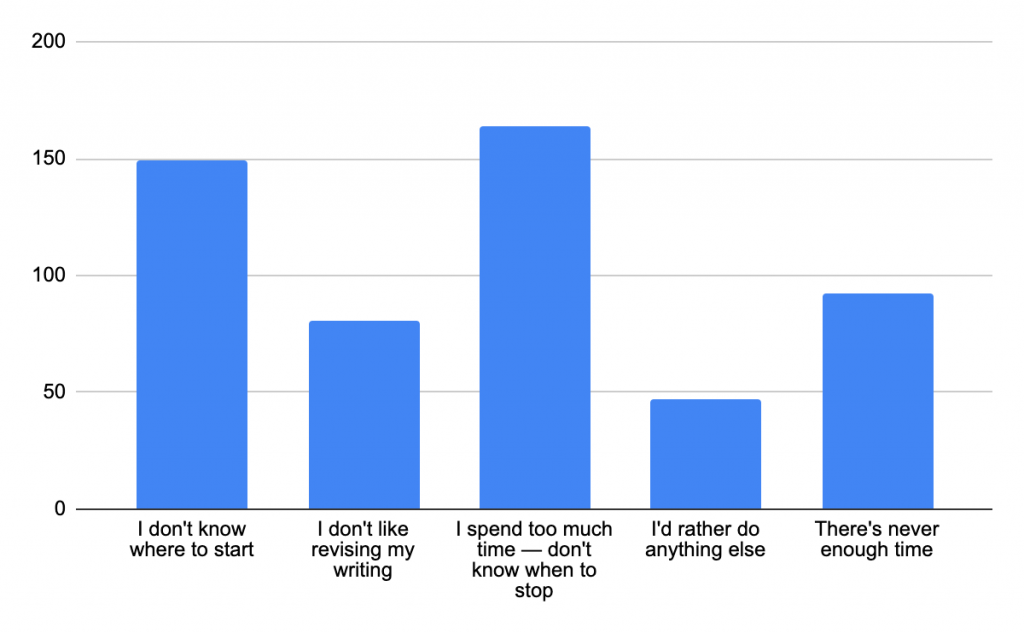
Just one more pass through this thing, then I’ll post it. Maybe tomorrow. It’s not good enough yet.
If you embrace the “write a messy first draft” mantra (and you should!), then you rely on revision and self-editing to make that draft presentable.
Great writing rarely shows up in the first draft. Revising is an essential part of the writing process, and you owe it to your readers.
But it has risks. You might spend all your time polishing the prose and never publish and move on.
Have you ever gotten stuck in the revision process? If so, you’re not alone.
Over the past few years, hundreds of people have taken a short online course I offer on revising and editing your own work. As part of the course, they identify their key issues with revision.
Here is the top problem identified by course attendees: “I spend too much time on it … I don’t know when to stop.”

These responses come from people who signed up for a course on revision and self-editing, so may not represent the world at large. Even so, it’s a common theme.
Why do so many of us get mired down in self-editing and polishing? Here are a few possibilities—see if any fit your situation.
Inefficient revision processes
When we don’t approach revision logically, we make more work for ourselves. For example, we might spend hours polishing words that we later cut because they don’t work or the piece is too long.
Be smart about revising and editing:
- Ahead of time, scope how much time you’re willing to invest in this work. (Some things deserve more careful editing than others.) Give yourself a deadline.
- Use a telescoping approach, starting with the big-picture questions like “does this work?” Then read it for flow. Focus on word choice and punctuation last.
- Use software to streamline the final polishing and checking. (Remember that you may not accept all of its suggestions.)
Resistance in disguise
Revision can be a disguise for Resistance—that force that keeps us from doing important work. (See my post on Resistance.)
The disguise works well. When you’re editing and tinkering, of course you are working on your writing. But ask yourself, does this effort replace other, more important writing?
It can be easier to polish sentences you’ve already written than to create new ones.
If you’re partway through a draft and would rather tinker with what you have than keep going, look for the signs of Resistance. Face it and forge ahead.
Fear
What if there’s a typo or I use the wrong word? What if everyone thinks I’m a terrible writer?
Putting work out in the world is frightening. The higher the stakes for a piece, the more time we will want to spend polishing it. That’s only natural.
But when fear takes over, the inner critic’s voice grows louder and harsher. Pretty soon, nothing on the page is good enough.
We can easily lose perspective.
If you’re feeling fearful, it might be time to seek encouragement from others. Or, let your work sit overnight and approach it with a fresh perspective.
Perfectionism (and spider webs)
We can also get stuck in revision out of a misguided impulse to create something perfect. (Perfectionism is another guise for fear and Resistance.)
Whenever I’m ready to publish a blog post or a book, I remember the myth of Arachne.
As Ovid tells the tale, Arachne could weave like nobody’s business. She was fantastic at it. She clearly invested her ego in her work—claiming the gods had no part in her excellence in weaving.
That boast bugged Athena (Minerva to Ovid), who promptly challenged her to a contest. Arachne wove something beautiful and perfect, which enraged Athena, who beat her over the head. (Yeah, perfectionists can make other people react that way!)
According to Ovid, Arachne hung herself in shame and Athena, perhaps feeling rather badly about her behavior, brought her back to life, transformed into a spider.
Her descendants still weave in my garden, rushing to repair their perfect webs from damage from rain, insects and wind. They remind me of the impossibility of perfection.

Don’t tempt the gods by trying to be perfect, or investing too much of your ego in your writing. Do good work—work that serves a purpose or is beautiful—then leave it for others and move on.
Related Content
Read Revising for Cognitive Ease.
Find more tips on a strong revision process in the online course Revising Your Writing.